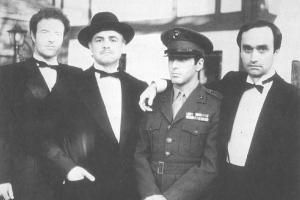 |
| Mario Puzo, author of The Godfather |
Was the Mafia always an organization chalk full of mystique, all dressed in suits, smoking cigars and drinking espresso?
 |
| "Sammy The Bull" |
In his account of organized crime in America, Mario Puzo (top left) creates a certain atmosphere that will forever be associated with the Mafia and Italian organized crime. After becoming a pentito (one who sells out secrets to authorities in exchange for criminal immunity) Salvatore "Sammy the Bull" Gravano (top right), previously a member of the Gambino crime family, became part of the Witness Protection Program, and then later left to live free of the government under an assumed name. Finding a man so obviously intertwined in the most esoteric ideals and actions of the Mafia who is no longer affiliated and willing to give his opinions on the Mafia is uncommon to say the least. The code of "omerta" does not allow for any member of the group to disclose any secrets, even to preserve their own life. The power of the group always takes precedence over the individual.
Jeffery Goldberg, of the New York Times Magazine, searched out Gravano in his new home state of Arizona to ask him "why so many mobsters continue to believe that the obviously mythical "Godfather" is an on-target depiction of the gangster life. (Goldberg, Jeffery).
The most interesting part about "The Godfather" is how Mario Puzo created it. According to Puzo, he had no help in creating the personas and idiosyncrasies of the mob. He claims that it was all imagined. Puzo himself was not an expert on Sicilian history or Mafia relations. In contrast he was more of an academic, winning critical acclaim on his first publications. (Goldberg, Jeffery) He has claimed to have written the book while hard-pressed for cash, hoping for a commercial success. Well, he seems to have struck gold, writing a classic story that has stood the test of time to be loved by multiple generations of people around the world. However, still even after portraying a gangster existence, he would refuse to write articles about the Mafia claiming he had no real knowledge on the subject.
If Mario Puzo had no real concrete knowledge of the Mafia, its personalities and ideals then how was he able to accurately portray them, to the point where even the Mafia themselves claim it to be true? It is because, although Puzo didn't directly tap into the Mafia, he did tap into human nature, critically analyzing situations according to what he seems to have understood about human actions and reactions. It is because of his knowledge of human nature, and its application to the given situation (the Mafia) that Puzo is able to create a realistic and convincing portrayal of the Mafia.
 |
| The Corleone Boys; Michael in WWII uniform |
For example when the trilogy begins, Michael is not involved in the family business. He is in the Armed Forces and swears not to be involved (picture left). However when his father's life is at stake because of rivalries with other families, Michael is the first to avenge his father's attempted murder by killing Sollozzo and McCluskey, a corrupt policeman and a rival Mafiosi. Another example of Puzo's understanding of understanding of human nature, intermixed with Sicilian culture, is the family's actions during the opening of Godfather I, at the wedding of Connie Corleone. Don Vito, the leader of the family and controller of all business, takes requests for favors from people on the day of his daughters wedding as is customary in Sicily. However, the requests are only for things of grave importance, for which the victim cannot go to the authorities, but must have taken care of internally. Don Vito obliges the favors, according to custom.
Is it possible for someone to understand something as obscure and hidden as the Mafia without having any direct, primary sources? According the Sammy "The Bull" Gravano, yes. Puzo achieved this in The Godfather through his understanding of culture and human nature. Francis Ford Coppola made it seem even more real with his painfully accurate presentation of the book, with some small exceptions. However, the end product created a distinct feeling that the Mafia portrayed by The Godfather, in the films as well as the book, was the actual Mafia of reality. It did this so convincingly that even a sworn Mafioso cannot tell the difference, and is convinced it is based on reality, not Puzo's inventive imagination.